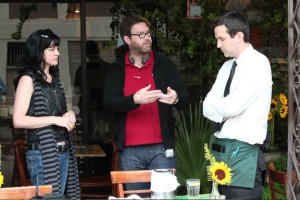As a student, Dan Beers ’97 spent most of his time in the Roy H. Park School of Communications working on films with other students. Now, the 35-year-old is using the skills he learned at school as the director of NBC’s new digital series “The Fact Checkers Unit.”

“The Fact Checkers Unit,” which features Bill Murray as well as celebrities such as Jon Heder and Alex Trebek, was the first online short to be shown at the Sundance Festival. The short was featured on FunnyOrDie.com, gaining over a million hits and has since developed into a digital web series posted on NBC.com.
Chief Copy Editor Qina Liu talked with Beers about his show, how he succeeded after college and how students can follow in his footsteps.
Qina Liu: Tell me a little more about “The Fact Checkers Unit.” Where did you get the idea?
Dan Beers: I’ve written some pieces before for Vanity Fair and there’s a person who would call me from the fact-checking department, and they would ask me some questions on the article. I always thought it was a funny job for people I’ve never met to just call me and be really intense, grilling me about this article and about writing the article. So that was always something I had in the back of my head. So [fellow writers] Brian [Sacca], Pete [Karinen] and I met, and they had a couple other ideas, and these two characters who were actually kind of cop-like characters. Out of these ideas, we turned it into the idea that exists: “The Fact Checkers Unit,” who are the two fact checkers who work at this men’s magazine.
QL: Where did this idea take you?
DB: This past year, NBC came on board to do this in a web series, which is amazing because we always hoped that we could get the opportunity again to do it. So we started writing in April and we shot it, of course, in June. And we shot eight webisodes in 12 days, which is a lot, and we got great people to be in it — Jon Heder, Alex Trebek — so it was a lot of fun.
QL: You mentioned through all this that you met your fellow writers Peter Karinen and Brian Sacca, who also play the fact checkers on your show, before filming. How important was networking through all this?
DB: Everything I’ve gotten in my career has been through networking — just getting out there and pushing yourself and trying to meet more people. It’s one of those things that I didn’t learn as much when I was younger — how much you have to get out there and meet people.
QL: Did you ever imagine that this is where you would be today?
DB: I would hope so. I was one of those dorks who made movies when they were 12 years old, so it has always been something I hoped to do, and I have been always wanting to make movies ever since I was a little kid. I was a video store clerk, so I would hope that I would be here, and I have been doing it, so it’s been great. I feel so lucky to be doing something you’re passionate about, and actually earning income as well by doing it. It’s the best.
QL: How did your education at Ithaca College play into your career?
DB: One of the reasons I chose Ithaca was the ideology of the school itself, or at least in the film school and Park School, was that as a freshman, you just went out and made things. During my first years there, I remember being handed a camera and just going out and doing things.
QL: You said networking has been an important part of your success. Do you have any other advice for aspiring film students who want to do what you are doing right now?
DB: In truth, being a film student or trying to get a job in the filmmaking career is really hard. A lot of people want to do it. It’s competitive. It’s really hard, so my advice would be if you don’t really want to do it, don’t do it because you won’t end up making it. … The first [thing] you need to do is you have to ask yourself if this is the thing that you want to do. If the answer is yes, then you have to go intern early, if you can, and get out there. You have to meet people because the more people you know, the better you are — just being prepared that it’s not going to be a simple calling. You really have to work harder than anything else in the world.
QL: How did you get through the hardships?
DB: I just really didn’t want to do anything else. I always wanted to make films as a kid and just my drive and passion. I took odd jobs as I needed to, but I was lucky as well. I met a really good group of people. … You have to go out there and work so hard, because there’s so many people out there who want your job. So you have to prove to them that you want it more, that you’ll work harder than anyone else. There are thousands of people out there for at least one job.




